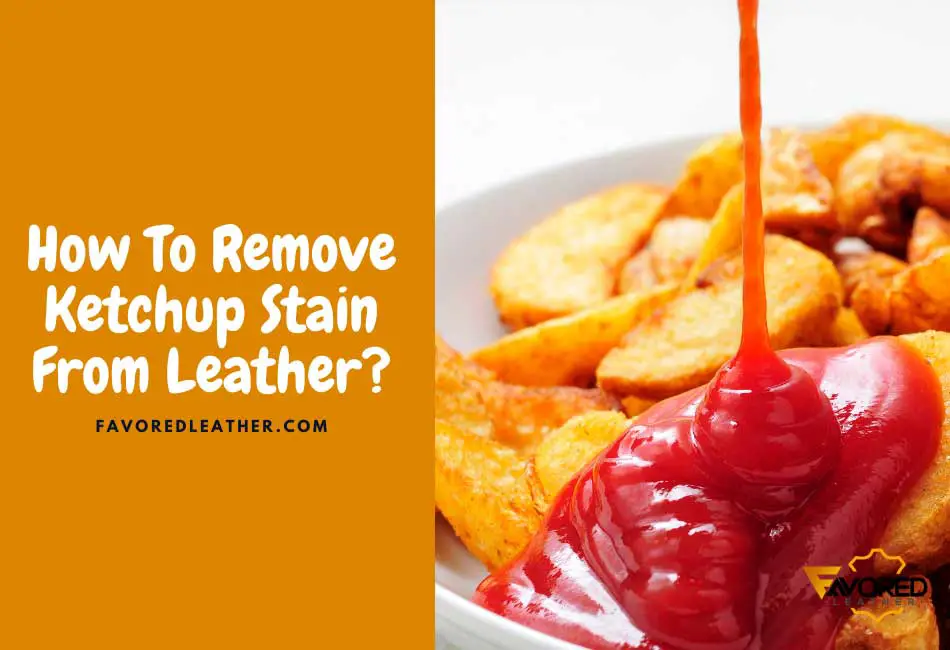We all love our fries or burgers with some ketchup, right? So it’s common to get ketchup on our leather upholstery or clothing. But can ketchup stain leather, and if so, what are some of the best ways to remove ketchup stains from leather?
Ketchup is a common condiment made from tomatoes, vinegar, spices, and sugar. These ingredients can cause ketchup to stain leather.
Fortunately, ketchup stains are not permanent on leather and can be removed using the right cleaning techniques, like dish soap and vinegar.
Keep reading as I shed more light on the reasons ketchup stains leather and a few household remedies you can use to get rid of the stains.
What Is Ketchup Made of And How Does It Work To Stain Leather?
As I rightfully mentioned, there are a few key ingredients in ketchup, with the main ones being;
- Tomatoes
- Vinegar
- Sugar
Here’s how these ingredients work on staining leather;
1. Ketchup Is Acidic
The vinegar and tomatoes in ketchup are acidic. And when leather comes into contact with a caustic substance, it causes the leather to change its color.
On top of that, the acidity in ketchup also breaks down the leather’s topcoat, making it more susceptible to staining.
While this can happen, it will take a few days or weeks for the color to change.
2. The Sugar In Ketchup Darkens Leather
Ketchup also contains sugar. And when this ingredient comes into contact with leather, it darkens the leather.
The sugar gradually darkens the leather the longer it stays on the surface.
It soaks up and dries out the natural oils in the leather, making it more brittle.
3. Ketchup Contains Natural Tannins
Another reason ketchup stains leather is because it contains natural tannins.
These natural tannins are in the tomato used to make ketchup, and they can cause leather to change its color when they come into contact with it.
Tannins are common in almost all plant and fruit juices and can be very difficult to remove from leather.
It is a form of natural coloring agent that can be found in leaves, bark, and fruits of plants.
Now that we know what ketchup is made of and how it works to stain leather let’s look at some of the best ways to remove ketchup stains from leather.
Tannins can cause leather to fade and change its color when it comes into contact with the leather.
This is because tannins interact with the natural proteins in leather which alters the color of the leather.
What Types of Leather Are Most Susceptible To Ketchup Stains And Why?
Not all leather are the same; some are more susceptible to ketchup stains than others.
The type of leather will determine how easy it is to remove the ketchup stain.
Smooth or finished leathers are generally the easiest to clean because they have a protective coating that repels stains.
On the other hand, natural or unfinished leathers are more porous and will absorb ketchup more readily, making them harder to clean.
These types of leather will usually require that you get the help of a professional leather cleaner.
The following types of leather are most susceptible to ketchup stains;
1. Aniline Leather
Aniline leather is a natural and soft type of leather that is dyed with soluble dyes.
This type of leather does not have a protective coating, making it more susceptible to staining.
2. Suede Leather
Suede leather is a type of napped leather that has a velvety surface.
This type of leather is also more susceptible to staining because it does not have a protective coating.
3. Nubuck Leather
Nubuck leather is similar to suede leather, but it has a bit more of a rough surface.
Nubuck leather is also more susceptible to staining because it does not have a protective coating.
How To Remove Ketchup Stains From Leather
You can use a few household remedies to remove ketchup stains from leather.
I will show you how to get rid of ketchup stains, no matter the type of leather you have.
1. Using Mild Dish Soap And Warm Water
This is one of the simplest and most effective ways to remove ketchup stains from leather.
This will work even if the ketchup has enough time to dry and set into the leather.
Also, you don’t have to worry if the leather is finished, unfinished, or suede;
What You Will Need:
- Mild dish soap
- Warm water
- A clean white cloth or sponge
- A soft-bristled brush (optional)
Instructions
Step One:
- Begin by removing any excess ketchup spills or blubs.
- Begin by mixing a solution of mild dish soap and warm water in a bowl.
- Swish, so the solution has a lot of lather.
Step Two:
- Dip your clean white cloth or sponge into the soapy solution.
- Make sure you wring out any excess water before proceeding to the next step.
Step Three:
- Now gently rub the stained area in a circular motion until the stain begins to lift.
- You may need to apply some pressure, but be careful not to scrub too hard, or you may damage the leather.
- If the stain is still not coming up, you can try using a soft-bristled brush to work the soap into the stain.
Step Four:
- Once the ketchup stain is gone, rinse the area with clean water to remove any soap residue.
- Use a clean, dry cloth to soak up any excess water.
Step Five:
- Allow the leather to air dry completely.
Step Six:
- Apply a leather conditioner to the area to help restore any lost moisture.
- This will also help prevent the leather from drying out and cracking.
2. White Vinegar And Warm Water
White vinegar is another great option for removing ketchup stains from leather.
The acidity in white vinegar helps to break down and remove stains.
White vinegar is also a natural disinfectant and will help to remove any bacteria that may be present on the leather.
What You Will Need:
- 1/2 cup white vinegar
- 1/2 cup warm water
- A clean white cloth or sponge
- Leather Conditioner
Instructions
Step One
- Start by blotting or removing any excess ketchup using paper towels or a blunt knife.
Step Two:
- Mix 1/2 cup of white vinegar and 1/2 cup of warm water in a bowl.
- Stir the mixture until it is well mixed.
Step Three:
- Dip your clean white cloth or sponge into the mixture.
- Make sure you wring out any excess liquid before using it to scrub over the ketchup stain gently.
- You want to go at it for about 30 seconds to a minute.
Step Four:
- Once the ketchup stain is gone, rinse the area with a water-damp clean cloth to remove any vinegar residue.
- Use a clean, dry cloth to soak up any excess water.
Step Five:
- Allow the leather to air-dry completely in a cool, dry place.
Step Six:
- Apply your usual leather conditioner to the area to help prevent the leather from drying out.
- Make sure to apply it in thin layers and allow each application to dry before adding another layer.
3. Baking Soda/Talcum Powder/Cornstarch
Baking soda, talcum powder, and cornstarch are all great options for removing ketchup stains from leather.
These powders work by absorbing the grease and oil from the ketchup stain, making them easier to remove.
What You Will Need:
- 1/2 cup baking soda, talcum powder, or cornstarch
- A clean white cloth or sponge
- Soft bristle brush
- Water
- Leather Conditioner
Instructions
Step One:
- Start by blotting or removing any excess ketchup using paper towels or a blunt knife.
Step Two:
- Sprinkle a generous amount of baking soda, talcum powder, or cornstarch onto the ketchup stain.
- Make sure the powder covers the entire stain.
- Allow it to sit for about 15-30 minutes so it can absorb the grease and oil from the ketchup.
Step Three:
- After 15 minutes have passed, use a vacuum cleaner, brush, or clean cloth to remove the ketchup and powder residue.
- You may need to do this a few times to make sure you remove all of the powder.
Step Four:
- Once the powder is gone, use a water-dampened cloth to wipe away any remaining residue.
Step Five:
- Allow the leather to air-dry completely in a cool, dry place.
Step Six:
- Condition your leather to help prevent the leather from drying out.

